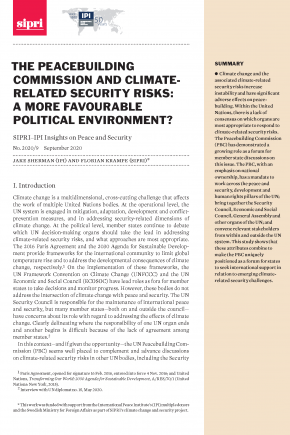The Peacebuilding Commission and Climate-related Security Risks: A More Favourable Political Environment?

Climate change and the associated climate-related security risks increase instability and have significant adverse effects on peacebuilding. Within the United Nations, there is a lack of consensus on which organs are most appropriate to respond to climate-related security risks. The Peacebuilding Commission (PBC) has demonstrated a growing role as a forum for member state discussions on this issue. The PBC, with an emphasis on national ownership, has a mandate to work across the peace and security, development and human rights pillars of the UN; bring together the Security Council, Economic and Social Council, General Assembly and other organs of the UN; and convene relevant stakeholders from within and outside the UN system. This study shows that these attributes combine to make the PBC uniquely positioned as a forum for states to seek international support in relation to emerging climate-related security challenges.
I. Introduction
II. Climate change, peacebuilding and sustaining peace
III. The role of the Peacebuilding Commission
IV. Climate-related security risks in the Peacebuilding Commission
V. Climate-related opportunities for the Peacebuilding Commission
VI. Conclusions: Move slowly, steadily—and forward

